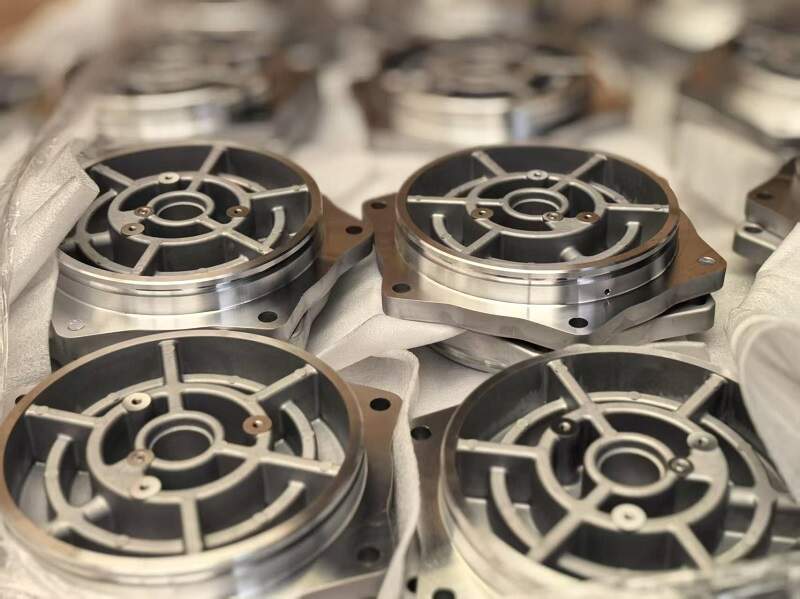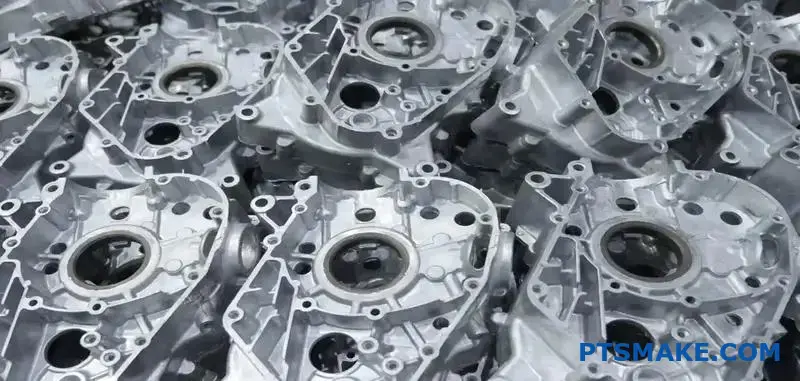Aluminum Foundry expertise that delivers superior product quality
Wiki Article
The Future of Light Weight Aluminum Foundries: Patterns and Developments Shaping the Industry
The aluminum factory industry is undertaking substantial transformation. Trick trends highlight the relevance of sustainability and efficiency. Technologies in smart production and automation are coming to be prevalent. Shops are increasingly concentrated on using recycled products. This shift elevates inquiries concerning future methods and modern technologies. Exactly how will these adjustments influence manufacturing methods and market characteristics? The responses may redefine the market landscape in unanticipated ways.Developments in Smart Production Technologies
As the light weight aluminum shop market develops, improvements in clever manufacturing technologies are becoming progressively crucial for boosting efficiency and performance. The assimilation of automation, expert system, and the Web of Things (IoT) is transforming traditional foundry procedures. These modern technologies allow real-time surveillance of processes, enabling for immediate adjustments that maximize outcome and minimize waste.Moreover, maker understanding algorithms examine production information to determine patterns and forecast upkeep needs, lessening downtime. Robotics are significantly used for repeated jobs, releasing proficient workers to concentrate on more complicated obstacles. In addition, digital twins-- virtual versions of physical processes-- facilitate simulations that can enhance layout and functional methods.
The adoption of these wise production modern technologies is driving competitive benefits in the light weight aluminum foundry industry. By enhancing operations and boosting decision-making capabilities, factories can fulfill growing market demands while keeping top quality standards. The future of light weight aluminum factories is undeniably connected to these technological developments.
Welcoming Eco-Friendly Products and Processes
The light weight aluminum factory sector is progressively concentrating on eco-friendly materials and processes to boost sustainability. This change consists of the adoption of lasting material sourcing, energy-efficient production strategies, and efficient recycling and waste monitoring approaches. By incorporating these practices, factories intend to reduce their environmental influence while maintaining competitiveness in the marketplace.Sustainable Material Sourcing
Just how can light weight aluminum shops enhance their sustainability efforts? Sustainable material sourcing has arised as a crucial technique in attaining this objective. By prioritizing recycled light weight aluminum, foundries can greatly lower their ecological impact, as recycled products need less energy and fewer resources contrasted to main light weight aluminum manufacturing. Additionally, sourcing products from certified suppliers that follow environmentally friendly practices advertises liable mining and decreases ecological impact. Foundries are additionally discovering alternate materials, such as biopolymers and environment-friendly coverings, to enhance conventional aluminum procedures. Teaming up with stakeholders, consisting of vendors and ecological organizations, promotes innovation in sourcing techniques. Ultimately, embracing sustainable material sourcing not just aligns with global sustainability objectives however likewise placements light weight aluminum foundries as leaders in eco accountable manufacturing.Energy-Efficient Manufacturing Techniques
Aluminum shops are increasingly adopting energy-efficient manufacturing methods to complement their lasting product sourcing campaigns. These techniques focus on decreasing power intake throughout the production process. Advanced modern technologies, such as induction melting and optimized casting procedures, are being applied to minimize the overall carbon impact. Additionally, automation and wise production systems enhance functional efficiency, enabling far better power administration. Foundries are likewise exploring the integration of renewable resource sources, such as solar and wind, to power their procedures. By focusing on power performance, light weight aluminum foundries not just lower production prices however likewise straighten themselves with worldwide sustainability goals, ensuring an extra ecologically liable approach to light weight aluminum production while meeting the increasing demand for eco-friendly methods in the market.Recycling and Waste Administration
Embracing green materials and processes, light weight aluminum factories are prioritizing recycling and waste monitoring techniques to boost sustainability in their operations. By integrating closed-loop systems, these centers are minimizing waste and maximizing resource performance. Scrap aluminum, a conveniently offered product, is being recycled on-site, considerably reducing the need for virgin products and reducing power consumption. Developments in arranging and refining technologies further promote the recycling of aluminum, making certain that even infected materials can be repurposed effectively. Additionally, factories are taking on sustainable practices such as lowering hazardous waste and advertising the use of eco-friendly materials for product packaging. This commitment to reusing not only decreases environmental influence yet additionally enhances the economic practicality of aluminum foundries in an open market.The Function of Automation and Robotics
Automation and robotics are significantly transforming the aluminum factory market, substantially enhancing manufacturing performance. By integrating advanced modern technologies, foundries can decrease labor prices while all at once enhancing safety criteria for their workforce. This shift not only improves procedures however additionally positions the sector for sustainable growth in an open market.Enhanced Manufacturing Efficiency
Changing production processes, the integration of sophisticated robotics and automation innovations has actually become a cornerstone for light weight aluminum factories seeking enhanced effectiveness. These technologies simplify process, minimize cycle times, and boost item top quality by lessening human error. Automated systems can monitor assembly line in real-time, permitting immediate modifications that maximize result. Additionally, robotics assist in the handling of dangerous materials, guaranteeing much safer workplace while enhancing throughput. Anticipating upkeep innovations additionally add to performance by preparing for tools failings, thus reducing downtime. As an outcome, aluminum factories can achieve better consistency in their products while reacting a lot more quickly to market demands. This embrace of automation is setting a brand-new requirement for productivity and functional excellence within the market.
Decreasing Labor Costs
The shift in the direction of progressed robotics and automation in light weight aluminum factories not only improves production performance however additionally plays a substantial duty in decreasing labor costs. By integrating automated systems, factories can lessen the dependence on hands-on labor, which frequently involves high incomes and training expenses. Robotics enhance repeated tasks such as putting, molding, and finishing, enabling a greater result with less workers. This technological modification not only reduces labor-related expenses yet also enhances uniformity and high quality in manufacturing. Automation can run around the clock, making the most of functional hours without the connected costs of overtime or change differentials. Consequently, aluminum factories can attain considerable savings while preserving affordable prices in a developing market landscape.Improving Safety Criteria
While standard aluminum factory operations commonly expose workers to dangerous settings, the combination of robotics and automation considerably improves security standards within the industry. Automated systems can execute high-risk jobs, such as liquified steel handling and hefty lifting, decreasing human exposure to unsafe conditions. Additionally, robotics can run in toxic atmospheres and severe temperatures, effectively decreasing the risk of injury. Advanced checking technologies and expert system assurance real-time safety and security evaluations, enabling for prompt reactions to possible dangers. Automation simplifies process, lowering the possibility of crashes triggered by human error. As an outcome, the fostering of these innovations not only improves security however likewise promotes a more productive and reliable working environment in light weight aluminum shops.Enhancing Energy Performance in Production
As aluminum factories look for to keep competition in a developing market, boosting power effectiveness in manufacturing has actually arised as a crucial emphasis. By embracing sophisticated innovations such as high-efficiency melting heating systems and automated temperature controls, factories can significantly decrease energy usage. Carrying out real-time surveillance systems permits exact monitoring here are the findings of power use throughout the manufacturing process, making it possible for quick adjustments to maximize efficiency.Additionally, moving to alternate power resources, consisting of eco-friendly options, can additionally reduce the carbon impact. The assimilation of energy recovery systems, which recover waste warmth for reuse, is becoming progressively typical. Training personnel in power monitoring techniques assures that everyone entailed in the production process bears in mind power usage.
These campaigns not only reduced functional prices but likewise line up with global sustainability objectives, placing aluminum foundries as accountable players in the sector while boosting their general competitiveness. - Aluminum Casting Company
Technologies in Recycling Light Weight Aluminum
Developments in recycling aluminum have gained energy alongside initiatives to boost power efficiency in manufacturing. The light weight aluminum sector has welcomed advanced modern technologies that enhance the recycling process, minimizing power consumption and ecological impact. Techniques such as hydrometallurgy and new sorting modern technologies improve the extraction of aluminum from scrap, improving yield rates and guaranteeing greater quality recycled material.
The advancement of closed-loop recycling systems enables factories to reuse light weight aluminum without substantial degradation in quality, making the process a lot more sustainable. Innovations in logistics and collection, including enhanced monitoring systems and automated sorting, have also played an essential duty in enhancing the efficiency of light weight aluminum recuperation. These improvements not just add to a round economic climate however additionally aid alleviate the carbon impact related to aluminum production. As the need for lasting techniques grows, these innovations place the aluminum factory field as a leader in liable source administration.
Reacting To Market Needs and Consumer Trends
Adaptability has ended up being a keystone for light weight aluminum shops reacting to advancing market needs and customer patterns. As industries significantly prioritize sustainability, aluminum foundries are changing towards environmentally friendly techniques, including boosted reusing processes and lowered carbon impacts. This change aligns with customer preferences for ecologically accountable products, driving foundries to innovate their offerings.Furthermore, the rise of light-weight products in aerospace and automotive sectors requires improvements in light weight aluminum alloys and casting strategies. Shops are buying r & d to produce high-strength, light-weight elements that satisfy stringent efficiency criteria.
Additionally, customization has actually acquired traction, with consumers looking for tailored services. Light weight aluminum shops are leveraging innovative production technologies, such as additional info 3D printing, to fit certain client demands effectively. This responsiveness not just pleases consumer demands but likewise placements aluminum shops competitively in a dynamic market landscape, ensuring their significance in an ever-changing commercial atmosphere.

Often Asked Concerns
Exactly How Do Light Weight Aluminum Foundries Effect Resident Economies?
Light weight aluminum foundries considerably affect regional economic situations by developing jobs, stimulating demand for local providers, and adding to area development. Their operations usually cause boosted tax revenues, which can money essential public solutions and framework renovations.What Are the Security Regulations for Light Weight Aluminum Foundry Workers?
Safety and security policies for aluminum foundry employees consist of required personal protective equipment, appropriate air flow systems, normal training on harmful products, and adherence to guidelines established by occupational health and wellness and security administrations to decrease dangers and guarantee employee security. - aluminum castingJust How Does Light Weight Aluminum Recycling Affect Global Supply Chains?
Aluminum recycling significantly decreases demand for resources, improves source effectiveness, and supports costs. This change influences worldwide supply chains by promoting a circular economic situation, advertising sustainability, and making sure a much more resilient sector in changing markets.What Job Opportunities Exist in the Aluminum Shop Market?
Numerous profession opportunities exist in the light weight aluminum foundry sector, including functions in engineering, high quality control, production management, and r & d. Experienced labor settings such as mold makers and device drivers are also popular.Exactly How Do International Profession Policies Impact Aluminum Foundries?
International profession plans considerably influence aluminum shops by impacting import tolls, supply chain dynamics, and market access. These variables can influence functional costs, competitiveness, and overall productivity within the worldwide light weight aluminum production landscape.By focusing on recycled light weight aluminum, factories can greatly reduce their environmental impact, as recycled materials need less energy and fewer resources contrasted to primary light weight aluminum manufacturing. Light weight aluminum foundries are significantly embracing energy-efficient production techniques to enhance their lasting material sourcing campaigns. Automation and robotics are significantly transforming the light weight aluminum factory market, considerably improving production efficiency. The change towards progressed robotics and automation in aluminum shops not only improves production performance but additionally plays a significant duty in lowering labor costs. As you could look here light weight aluminum foundries seek to keep competition in a developing market, boosting power effectiveness in manufacturing has actually emerged as an important focus.
Report this wiki page